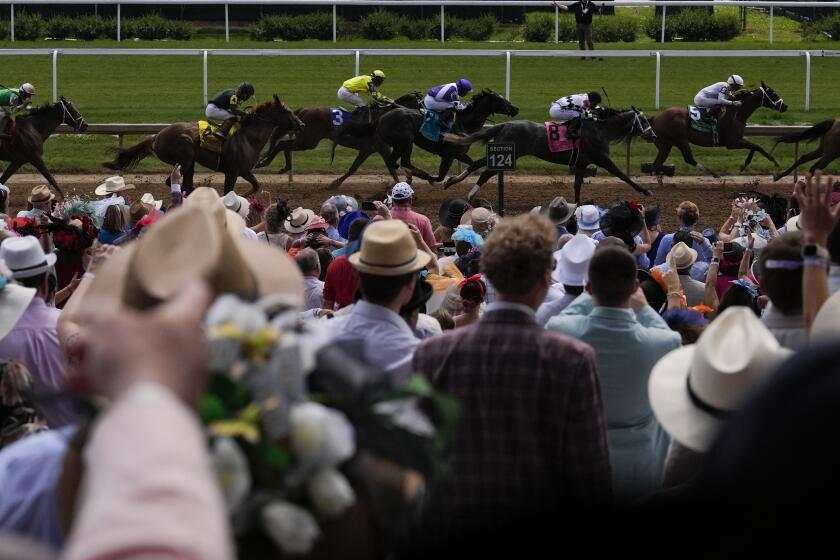Pitchers Find Plenty to Balk About
- Share via
Here a balk, there a balk, everywhere balks. At the current pace, more than 2,000 will be called in the major leagues this season, prompting Yankee Manager Billy Martin to quip: “People don’t even come out to see a ball game anymore. They come out to see a balk game.”
In the first nine days of the season, umpires called 69 balks in the American League and 29 in the National. This, compared to six in the AL and 19 in the NL in the first nine days last season.
Through Sunday, 109 AL and 53 NL balks had been called, making it almost certain that last year’s all-time highs of 137 AL and 219 NL balks will be eclipsed.
Who’s balking?
Boston’s Roger Clemens led the majors with six through Sunday’s games, and New York’s John Candelaria and Oakland’s Dave Stewart had five each.
Kansas City reliever Dan Quisenberry, who in nine years and 896 innings had not been called for a balk, was called for one April 9.
Minnesota reliever Jeff Reardon, who hadn’t been called for a balk in eight major-league seasons and 746 innings, was called for one April 8 in his first appearance of the year.
Oakland reliever Rick Honeycutt and Texas starter Bobby Witt tied the AL record for balks in an inning with four. The record was set by Vic Raschi of the Yankees in 1950.
In two AL games--Milwaukee-New York April 10 and Chicago-California April 12--six balks were called. The Brewers have been called for 11 balks in their first 11 games (five on April 10). In a 7-1 loss Friday to the Yankees, a perplexed Mike Birkbeck was called for three balks in 1 innings and said after the game: “I honestly don’t know what a balk is.”
The additional balk calls were caused by a change in the rule’s terminology. That change was set in motion by St. Louis Manager Whitey Herzog, who was so infuriated by the pitching of Minnesota’s Bert Blyleven in the World Series last fall that he sent a tape of what he said were 19 Blyleven balks to Commissioner Peter Ueberroth.
That led to new language, drawn up by the rules committee and approved by the Major League Baseball Players Association, which states that a pitcher must bring his hands to a complete stop, usually at his waist, before beginning his delivery to the plate. Pitchers like Texas’ Charlie Hough were considered notorious for “quick pitching” in an attempt to gain an edge on base runners.
“I’ve never viewed the ability of the pitcher to adapt as being all that difficult,” AL President Bobby Brown said. “Perhaps I’ve been wrong. I played in an era when a stop wasn’t a problem and I didn’t think it would be such a problem.”
Neither did most umpires, who assumed the plethora of balks called in spring training, including seven in one inning on Hough, would have made pitchers adjust.
“To me, I would think the pitchers would have wised up yesterday,” said AL umpire Mike Reilly. “To me, it’s not that tough a thing.”
To pitchers accustomed to years of not delaying their deliveries, the new terminology has been bothersome. In the past, Reilly said umpires considered a pitcher to be stopping when he brought his hands to his waist and then raised them to deliver the ball. That “change in direction” was considered enough.
“The rule never read ‘stop’ before,” Reilly said.
But Baltimore pitcher Mike Boddicker said it’s not that simple.
“The problem is not bringing your hands to a stop,” he said. “I can do that, no problem. When you get into the problem is when you’re concentrating so hard on the guy at the plate. For as long as I’ve been in the game, that’s where your concentration has been focused. Now, all of a sudden you are told to do certain things with your hands. . . .
“It’s like anything else. They call it when they want to call it. It keeps happening, though, when there are guys on third base.”
Said Sandy Alderson, Oakland’s vice president of baseball operations, “Our pitchers say it is difficult to change something consciously that they have been doing unconsciously for years.”
Brown said he thinks past acceptance of the “change in direction” concept by AL umpires gave the new balk rule greater impact than in the NL, which was more stringent about requiring a stop. “That changed the idea of what constituted a balk (in the AL),” Brown said.
But many in baseball question the need for the stringent enforcement.
“It’s stupid, that’s what it is,” said Martin. “I don’t know why anyone would get the idea they were helping the game.”
Said Alderson, whose team was called for 18 balks in its first 12 games, “We’re not happy with it. We’ve made our views on the subject clear to the American League office.”
After this season, the players association can request a change in the new terminology. Brown said if that happens the rules committee could use the original wording next season and return to this season’s terminology in 1990 on a permanent basis. Players association director Donald Fehr has not returned phone calls.
For their part, the umpires aren’t yielding. “We’re going to call them,” Reilly said. “We’re doing what we were told to do. If the manager tells you to swing you’d better swing. My bosses are telling me to call balks and we are doing it.”
More to Read
Go beyond the scoreboard
Get the latest on L.A.'s teams in the daily Sports Report newsletter.
You may occasionally receive promotional content from the Los Angeles Times.










